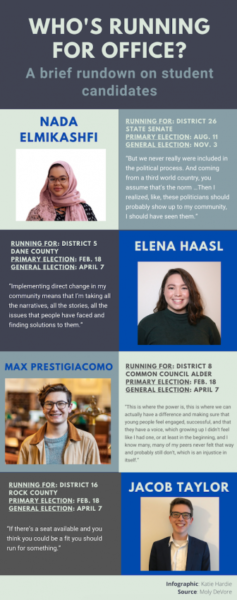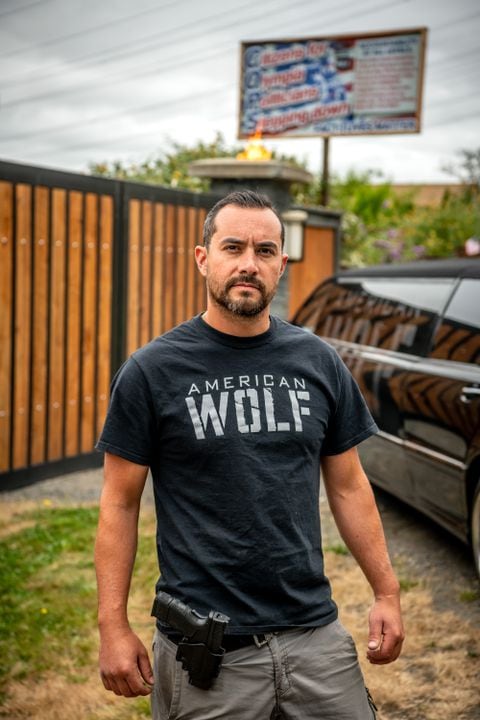Elena Haasl’s apartment is crammed with students, talking over bowls of Oreos and posing for photos. It’s a typical college gathering — only the students are talking political strategy and there are “Elena Haasl for District 5” signs everywhere. This is a launch party.
At 20 years old, Haasl is a University of Wisconsin sophomore, double majoring in community and environmental sociology and political science, along with a certificate in gender and women’s studies. She is also a candidate for the District 5 County Board.
While this may be Haasl’s launch party, she is not the only student candidate present — next to her stands Jacob Taylor, a junior at UW and candidate for the District 16 Rock County Board. Max Prestigiacomo, a UW freshman and the uncontested District 8 Alder candidate, is hurrying Nada Elmikashfi, a UW super-senior and candidate for the District 26 State Senate, to the door — they’re running late to their Sustainable Madison Committee meeting.
These four student candidates vary in age, experience, background and major, but are nonetheless all seeking to be elected. Their interests all align in being deeply passionate about bettering their community through civic engagement.
The Power of Lived Experience
Haasl, discussing her bid for the District 5 County Board seat, said it is important that a student fill the chair because it’s the only district made up of mostly students. She said that as a student, she knows the issues her constituents face because she has class with them, rides the bus with them and even lives with them.
“I know the issues because I am active in it all the time,” Haasl said. “People talk about the issues that are important to them when I’m sitting in class. I come home to constituents of District 5 that are my roommates. Having that kind of unique experience also allows you to speak honestly on situations, and it also opens up conversations and potential policy platforms.”
Haasl also has direct experience with many of Madison’s most pressing issues and how they often coalesce. She said that as a biracial, queer woman, intersectionality is something she has to think about everyday.
This kind of direct experience with the issues is part of what makes younger candidates so impactful, according to Elmikashfi.
Elmikashfi immigrated to Madison’s West side from Sudan at the age of six. As a low income black family in what is now the most segregated state in the country — according to a Wallethub ranking — her family had to move around a lot. She was not aware this was a systemic problem until she found a word for her experience — gentrification.
This lived experience of being displaced helped Elmikashfi realize affordable housing has to be a priority. She said many addressable issues have only gotten worse under the current leadership, and she added that part of this inaction comes from a lack of lived experience.
“If you look at bills for years, how many of these little changes have we missed?” Elmikashfi said. “That’s why I think someone with lived experience needs to be in the Capitol, and not someone … who hasn’t connected with the working class for a very long time. Maybe that’s shady, but it’s the truth.”
This lived experience is also what makes addressing climate change so important to young voters, according to Prestigiacomo. He said young people have a vested interest in the environment because it directly impacts their future.
Prestigiacomo said his experience as a climate activist has taught him the importance of engaging with young people in a meaningful way. He said after attending the United Nations Climate Summit, he thought a lot of these government-organized events boiled down to just photo-ops.
Prestigiacomo said at the Climate Summit, youth were excluded from certain rooms and nothing got done. His experience showed him the importance of coalition building and letting young people lead the discussions.
“Young people are the ones with the ideas that can take us from point A to point B,” Prestigiacomo said. “City government is pretty pessimistic a lot of the time … But, the young people in the room, being very vocal, being very loud about the injustices and what’s going to be the future will help remind them of that urgency.”
And as all the candidates would agree — one way to include the youth is to have them in office.
Active Engagement
Youth civic engagement is on the rise across the country with UW’s student voter turnout jumping from 35.6% in 2014 to 52.9% in 2018. National voter turnout among 18 to 29 year olds followed the local upward trend, going from 20% in 2014 to 36% in 2018.
Despite this increase, young people remain largely uninvolved in local government. District 8, which encompasses UW’s campus, has the lowest voter count out of all 20 districts, according to Wisconsin Elections Commission. This is despite having the fifth largest population, according to a report from the City of Madison Planning Commission.
This participation in local government is key, as it allows constituents to be more engaged with their elected officials, according to Haasl.
“I think it kind of sets the mark for new ideas and new conversations to really take off from,” Haasl said. “I love how centric to the community local politics is.”
Taylor said in his hometown of Beloit, local government can be difficult to engage with. Taylor’s opponent, current District 16 Rock County Board Supervisor Phil Owens, was actually appointed to the board in 2015 because no one else ran, Taylor said. Taylor added that in Rock County, this is fairly common. In Rock County, 11 out of the 29 board members were appointed, not elected.
Taylor said throughout the course of his campaign, he has knocked a few hundred doors and has yet to meet someone who knows who Owens is. Taylor attributed this to Owens lack of contest — he’s never had to form a specific platform because he has yet to compete with someone for his role. The only way for constituents to know how Owens votes is to attend the county board meetings, read the minutes or listen to them online, Taylor said.
Even if constituents do follow the decisions of the board, there are few opportunities for direct participation, as Rock County has not utilized many referendums.
In Fall 2018, Rock County did in fact put a marijuana advisory referendum on the ballot. But, when the majority of residents said they supported legalization, nothing was ever done with the information, nor have steps been taken towards legalization, Taylor said.
Community members not feeling heard by local officials is not unique to Rock County. Elmikashfi said when she spoke with the elders in Madison’s Sudanese community, she found that none of them could remember meeting a single senator.
Elmikashfi said it is important for elected officials to actively engage with all constituents in an accessible way. The incumbent District 26 State Senator Fred Risser, was first elected in 1962, making him the longest serving state legislator in the United States. Elmikashfi noted that Risser has not updated his Twitter since last spring.
“If that is one of the ways that you’re supposed to connect with your constituency and you’re not doing that, how else are you gonna do that?” Elmikashfi said. “I think people should understand [the state senate seat is] not [only] a career, it’s literally the livelihood of Madison.”
Prestigiacomo said one way to empower a larger proportion of the community is to lower the voting age, and he would push for it as an important step in re-enfranchising young people. He said it should be lowered, if not for city elections, then for school board elections, because candidates should be accountable to the people they hope to represent.
In the meantime, Prestigiacomo is working with current District 8 alder and UW grad student Sally Roher on establishing a campus neighborhood association.
Elmikashfi said providing these platforms for all members of the Madison community is essential to making good policies.
“It’s the people’s platform … people that are actually affected by these are the people that are writing these,” Elmikashfi said. “The constituency has the solution. It’s not me, I’m just a vessel for that in the Capitol.”
Governmental Gatekeeping
Engaging with constituents as a candidate may be key to creating equitable platforms, but getting these platforms into the Capitol may be difficult due to the state government’s many gatekeeping mechanisms, according to Elmikashfi.
Some of this gatekeeping is centered around identity, Elmikashfi said. A representative Elmikashfi had looked up to said she thought Elmikashfi would face a lot of pushback during her campaign because she is a young woman of color. She then urged Elmikashfi not to run.
Elmikashfi said this diluted her entire candidacy, disregarding her qualifications and platform and implying she wouldn’t be as productive in the Senate because she is young and black.
“That just reminded me that my blackness, I’m not running in spite of it,” Elmikashfi said. “My skin color has given me challenges that I’ve learned to work very creatively around. And I think that’s not something that’s going to hinder me but inform the way I legislate.”
Haasl said she has had similar experiences. She said people have tried to erase parts of her identity, likely because she is not running on identity alone.
Working around the Capitol’s gatekeeping has brought these young candidates together, as they are running without an institutional network backing them, Elmikashfi said. Elmikashfi is managing Haasl’s campaign and all four have attended each other’s campaign events.
Elmikashfi said what they are doing is unprecedented and because they are running grassroots campaigns without institutional support, they are forming their own. Through collaboration and learning from one another they have formed their own coalition of sorts, one that has a shared vision for UW students, Elmikashfi said.
Being less entrenched in traditional governmental institutions is an advantage to Prestigiacomo, who said politics is inherently inaccessible to a lot of people because it is so rooted in complicated theory.
Prestigiacomo joked that, while he will “be the only alder with acne,” he thinks he will bring a fresh new perspective to the council
“It’s important for the young district alder to keep your eye on the prize, and keep that uncompromised opinion of what the future looks like and what young people want, which is more progressive policies at the city level,” Prestigiacomo said.
Taylor said he believes his young age is an advantage because a lot of people want a younger demographic to go after these opportunities.
The data, too, suggests there might seem to be a push for more youth in elected office. A recent poll conducted by the Associated Press-NORC Center for Public Affairs Research and MTV found that 79% of Americans ages 15 to 34 thought leaders from their generation would do a better job running the country.
Ensuring this support for young candidates goes beyond just a photo-op can be difficult, as Elmikashfi said elected officials often call her an “inspiration,” whilst telling her she is not experienced enough to run.
Haasl said a lot of this support for young candidates stops once they begin campaigning.
“People always want young people to run for office, and say that they’ll support them until it’s actually time for them to run for office,” Haasl said.
Shocking the System
Despite the barriers, these candidates are determined to make real change. All four of them cited frustrations with current government when explaining how they got into politics.
Haasl said racism should not still be an ongoing issue at UW in 2020, and college should be a place everyone feels welcome. She expressed frustration at the idea that diversity being positive isn’t something innate to campus culture yet.
Prestigiacomo echoed this frustration with the pace of change in Madison. After a year of unsuccessfully trying to work with the council on climate action, he said, he decided to become an alder himself.
Elmikashfi said some of this inaction is due to pessimism within the Capitol, saying the parties clash heavily and view the other as inherently negative. But she said Wisconsin has passed a lot of important bipartisan bills in the past, and that representatives need to have the intention and willingness to go after change.
With Wisconsin becoming steadily more segregated, Elmikashfi said this inaction cannot continue.
“If someone had had the intention years ago, to not get us where we are now, we wouldn’t be, four more years of leadership, or advocacy that doesn’t come from someone that knows what it feels like to be marginalized, you’re going to miss being able to change the system,” Elmikashfi said. “Four more generations of our children will grow up in socio-economic disenfranchisement.”
These candidates are ready to end this inaction and engage with constituents in modern ways. Elmikashfi said she frequently lays out her platform to Uber drivers. Prestigiacomo said he will go to where students are — their phones, using digital platforms to communicate with his constituents. Taylor said he wants to start live streaming County Board meetings so more people can know what’s going on.
While each candidate may have different innovative approaches to spreading their platform, they all want to reach more people. With the primary on Feb. 18, the general election on April 7 and the state senate primary on Aug. 11, campaigning efforts have ramped up.
Regardless of the election results, the students say they will continue to push for progressive change. Elmikashfi said it is time for someone extreme, someone who will ask for a lot and, even if they don’t get all of it, will push the needle a little further in the right direction.
“I think that repeating the same methods over and over that clearly haven’t worked is insanity,” Elmikashfi said. “So you need someone to shock the system a little bit, to show them that your constituency is very diverse … and you have to be held accountable for that.”

Katie Hardie/The Badger Herald


